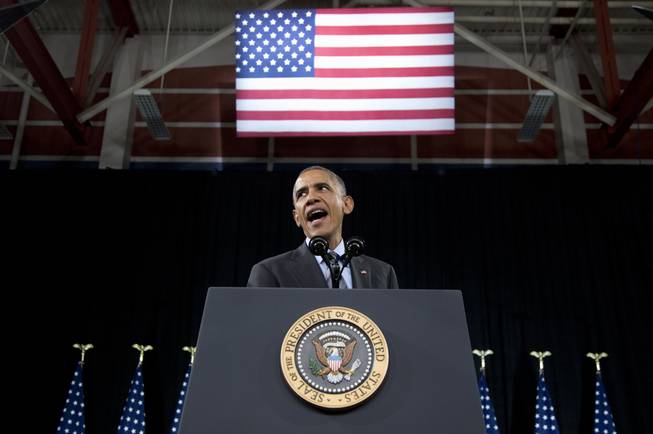
Carolyn Kaster / AP
President Barack Obama speaks about immigration, Friday, Nov. 21, 2014, at Del Sol High School in Las Vegas. The president unveiled expansive executive actions on immigration Thursday night to spare nearly 5 million people in the U.S. illegally from deportation, setting off a fierce fight with Republicans over the limits of presidential powers.
Tuesday, Dec. 23, 2014 | 2 a.m.
The people said to benefit most from President Barack Obama’s recent immigration order are undocumented parents of children living in the country legally.
But in Las Vegas, another group stands to win big from Obama's directive — exploited workers toiling on the fringes of the city's massive tourism industry.
“Labor trafficking doesn’t get as much attention as sex trafficking, but it’s much more prevalent,” said UNLV law professor Fatma Marouf, who helps run the school’s immigration law clinic. “A lot of manual labor, especially, is where you find people being exploited by their employers.”
The Trafficking Victims Protection Act of 2000 defines exploitation as the “recruitment, harboring, transportation, provision or obtaining of a person for labor or services, through the use of force, fraud or coercion for the purpose of subjection to involuntary servitude, peonage, debt bondage or slavery.” In Las Vegas, experts say labor trafficking victims are usually working in smaller hotels, restaurants and entertainment venues, as opposed to the Strip’s closely regulated and unionized mega resorts.
The new deal will offer more protections for undocumented workers. Marouf sat down recently to explain why that’s important Nevada, which has the highest population share of undocumented immigrants in the country.
The conversation has been edited for brevity and clarity:
How will the new deal help working immigrants?
Obama issued a memorandum calling for “modernizing and streamlining” the immigrant visa system. The goal is to have temporary work visas processed more quickly — reducing wait times — and to make sure that immigrant visa numbers are consistent with demand. This should make it easier for skilled and unskilled workers to obtain visas to work in the U.S., which will reduce fraud and exploitation, including labor trafficking. One of the major hurdles for these workers is the labor certification process, which requires the Labor Department to determine that there aren’t enough U.S. workers for a certain position. That process is one of the things being reviewed. The work training process for foreign students is also being expanded.
The Labor Department has also announced a government coalition designed to help protect workers who find themselves at the intersection of immigration and labor protection laws.
How widespread is labor trafficking?
The thing with trafficking is that nobody has statistics — a lot of numbers are just estimates. Estimates say as many as 27 million are victims of human trafficking globally. And the ratio of sex to labor trafficking is 1 to 9.
In the United States alone, the State Department estimates human trafficking numbers to be as high as 17,500.
In Las Vegas, what industries are these workers typically in?
The industries where trafficking is especially common is in the hotel and service industry. We’re talking about low-tier jobs, like servers or custodians. Interestingly, health services is also one of the more predominant areas where people work in the shadows. They’ll usually be in group homes and nursing homes where people care for the mentally ill or the elderly — places that aren’t regulated heavily.
They’re sometimes working overtime without getting paid or not getting enough days off — things that violate labor laws. But a person might not know they’re owed more money or conditions in their own home country might be even worse.
There are also a lot of people being exploited in the sex industry. This is not always necessarily involving prostitution, but we’ll often see girls who work in massage parlors and they’re being exploited by being forced to work at a front desk or a back room.
And the further you get from unions in Nevada, the more abuse you typically get.

Join the Discussion:
Check this out for a full explanation of our conversion to the LiveFyre commenting system and instructions on how to sign up for an account.
Full comments policy